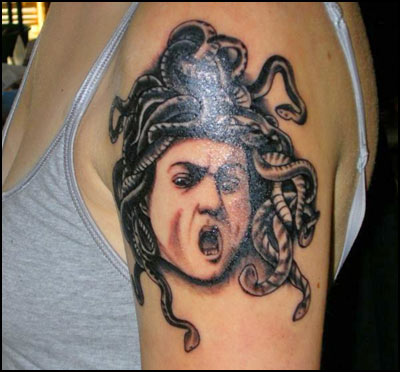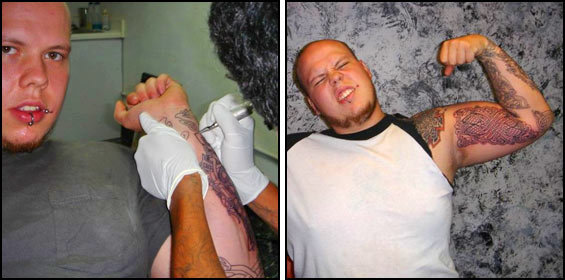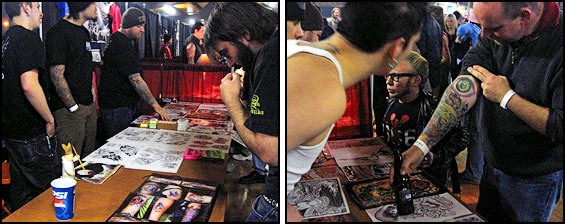
By Marisa Kakoulas DiMattia Oklahoma — the last US state to outlaw tattooing — will now lift its body art ban and a law legalizing and regulating tattooing will take effect November 1st of this year. No longer will Oklahomans be relegated to their cousin’s kitchen table to get needled. No longer will police raid tattooists while the state makes the Top 15 in the nation for violent crime. And no longer will it be illegal to pay homage to Garth Brooks, Oklahoma’s homeboy, with a portrait tattoo tribute.  Tattoo of another musical icon, done “illegally” in Oklahoma Today, the Governor of Oklahoma signed Senate Bill 806, which recently was passed in the Oklahoma House of Representatives and Senate. House Representative Al Lindley, who co-authored the bill with State Senator Frank Shurden, has tried for the past seven years to pass legislation to legalize tattooing. This year he succeeds. Previous attempts to pass this legislation were been blocked by Republican legislators in Oklahoma on “moral grounds.” But perhaps this year they realized that having their constituents get tattooed in unregulated and unsanitary conditions, risking infection, is not only immoral, it is unjust. Then there’s the case challenging the ban filed by a tattooer arrested in a studio raid. A court ruling that the ban is illegal means that tattooing in the state may have been legalized with legislators having no say at all. This seems to have lit a fire under their pious butts. Still, morality will figure prominently even if Bill 806 is passed. House amendments to the tattoo bill include a prohibition on body art business operating within 1,000 feet of a church, school or playground. In a state where there’s a church on every corner, this is no small restriction [Editor’s note: Jon from Fishing Fury points out that this is potentially a racist law due to the increase in church volume in African American communities in Oklahoma]. Evidently, legislators felt the need to protect Oklahoma’s youth from, say, tattooed lawyers like myself.  Even looking at this tattoo, done “illegally” in Oklahoma, can turn you to stone or worse! Another obstacle for tattoo and piercing business owners is the requirement to post a surety bond of $100,000 in order to be licensed — an incredibly high amount. While tattoos may have become mainstream, most artists I know are not endowed with trust funds [Editor’s note: So the law is class-ist as well?]. Those operating without a license once the bill is passed will face stiffer penalties as well; instead of the current $500 fine, a penalty of $5,000 will be imposed. The possibility of up to 90 days in jail remains the same. Despite the restrictions and high fines, the tattoo bill does do a lot of good by protecting tattoo lovers from the risk of infection and hepatitis. (An outbreak of hepatitis B in one Oklahoma county was tied directly to unsanitary home tattooing practices.) In order to be licensed, and therefore legal, tattooers will be required to obtain training in blood-borne pathogens, their work environment must conform to health and hygiene standards, equipment must be inspected, and procedures such as single-use needles and ink caps must be adhered to, among others. The new law will also prohibit artists from tattooing anyone under 18 or under the influence of drugs or alcohol.  Oh, but breaking the law was fun! Properly trained tattooists already follow these standards so they shouldn’t be overly burdensome. The law will be heavy for kitchen table scratchers. While you can get a home tattoo kit off of eBay for cheap, autoclaves and other sterilization equipment are expensive. Tattoo artists that follow the rules have higher costs and, thus, their prices may be higher. With tattooing legalized, these artists will face less competition from bargain-rate amateurs who may charge less but at the cost of the client’s health.  At the First Oklahoma Convention There’ll still be plenty of Oklahoma artists to choose from anyway. According to The OU Daily, 300 underground artists are already tattooing in the state with 14 tattoo studios openly doing business in the Oklahoma City area despite the ban. A tattoo convention in Tulsa even took place April 1 & 2nd, drawing local and national artists to The Hive club, the only place willing to have the event. Interestingly, the police didn’t conduct one of their tattoo raids at the convention. The Tulsa County District Attorney Tim Harris told the Associated Press that tattoo law violations are a “low priority” compared with the load of homicide cases he faces. Now police can catch real criminals instead of arresting artists. Marisa Kakoulas DiMattia This article was not intended as legal advice. It is intended for only general information purposes. This article does not create any attorney-client relationship.
|
Post navigation
 BME/News and Modblog highlight only a small fraction of what BME has to offer. Take our free tour and subscribe to BME for access to over 3 million body modification related photos, videos, and stories.
BME/News and Modblog highlight only a small fraction of what BME has to offer. Take our free tour and subscribe to BME for access to over 3 million body modification related photos, videos, and stories.
